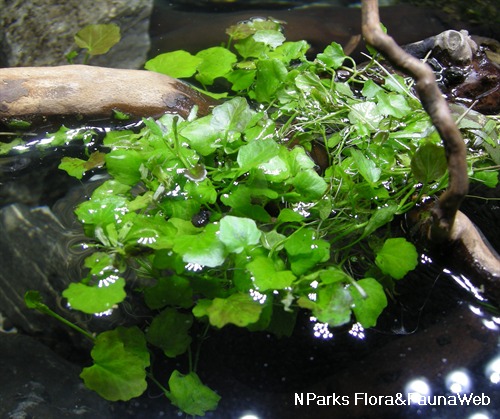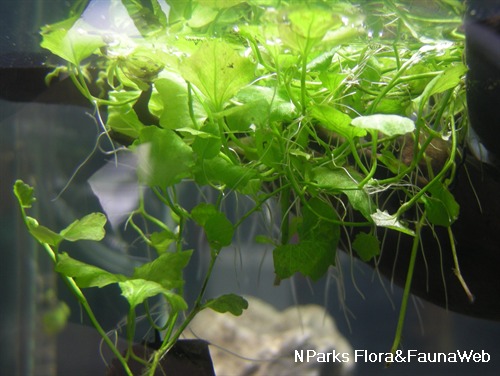
Back
Cardamine lyrata Bunge
| Family Name: | Brassicaceae (Cruciferae) |
| Common Name: | Japanese Cress, Chinese Ivy |
Name
Classifications and Characteristics
| Plant Division | Angiosperms (Flowering Seed Plants) |
|---|---|
| Plant Growth Form | Aquatic & Hydrophyte (Submerged Aquatic) |
| Lifespan (in Singapore) | Perennial |
| Mode of Nutrition | Autotrophic |
Biogeography
| Native Distribution | Subtropical Asia |
|---|---|
| Native Habitat | Aquatic (Freshwater Pond / Lake / River) |
| Local Conservation Status | Non-native (Horticultural / Cultivated Only) |
Description and Ethnobotany
| Growth Form | An herbaceous underwater plant, it has a creeping growth form. |
|---|---|
| Roots | The plant forms nodal roots along the stem which absorb nutrients from the water. |
| Foliage | The simple leaves are bright green and bean shaped with gently serrated edges. |
| Stems | The slender stems are long and herbaceous and can grow up 35cm in length. The trailing stems are aesthetically pleasing underwater but are fragile break easily. |
| Habitat | It is naturally found in swamps. |
| Cultivation | It is ideally grown in low water temperatures of 15 to 22°C under bright light where the plant will grow rather bushy. The water temperature should not exceed 28°C or else the plant leaves will be smaller and the stems, more lanky, giving it an unpleasant look. As the stems are fragile, the plant should not be grown in an freshwater aquarium with a strong water current. |
Landscaping Features
| Desirable Plant Features | Ornamental Foliage, Ornamental Form |
|---|---|
| Landscape Uses | Aquarium / Aquascape |
Plant Care and Propagation
| Light Preference | Full Sun |
|---|---|
| Water Preference | Lots of Water |
| Potential Problems | As the plant stems are fragile and break easily, it should be planted in a freshwater tank with little to no water current. |
| Propagation Method | Stem Cutting (Herbaceous) |
Foliar
| Foliage Retention | Evergreen |
|---|---|
| Mature Foliage Colour(s) | Green |
| Mature Foliage Texture(s) | Smooth |
| Foliar Type | Simple / Unifoliate |
| Foliar Arrangement Along Stem | Alternate |
| Foliar Attachment to Stem | Petiolate |
| Foliar Margin | Serrate / Toothed |
Image Repository
Others
| Master ID | 31338 |
|---|---|
| Species ID | 5735 |
| Flora Disclaimer | The information in this website has been compiled from reliable sources, such as reference works on medicinal plants. It is not a substitute for medical advice or treatment and NParks does not purport to provide any medical advice. Readers should always consult his/her physician before using or consuming a plant for medicinal purposes. |

